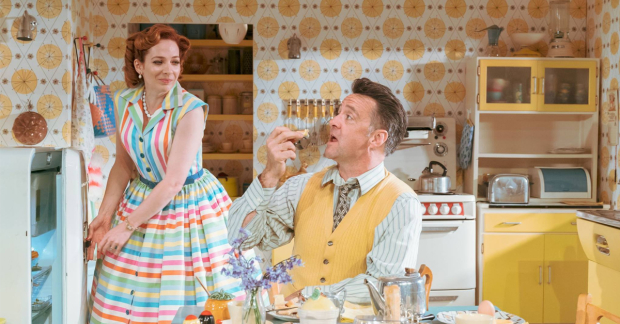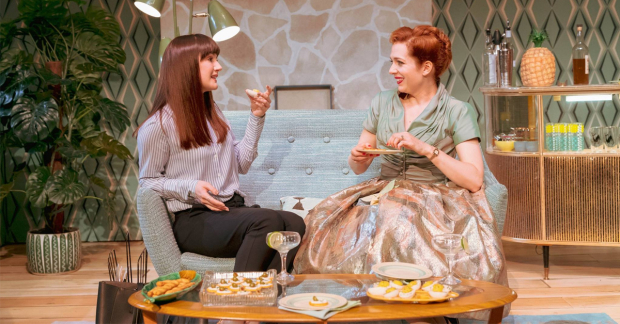Review: Home, I'm Darling (National Theatre)
Katherine Parkinson stars in Laura Wade’s play which transfers from Theatr Clwyd

© Manuel Harlan
The set, designed by Anna Fleischle, is a doll's house perfect home, bedroom and bathroom above, living room and kitchen beneath, bisected by a neat front door. In the opening scene, Judy (Katherine Parkinson) smilingly folds back the frontage to let us inside, proudly displaying the green-sworled wallpaper and the sunshine-bright kitchen.
She prepares the breakfast, a song of the Fifties on the radio, whistling while she works. Her husband Johnny (Richard Harrington) bounds downstairs to be served, eating homemade marmalade on his toast, having his tea poured from a pot and through a strainer. They discuss owning chickens and decide they are deliriously, deliciously, appallingly happy. It is only when he leaves for work, that Judy pulls a laptop from the drawer and we realise we are in this century not the last.
This is just one of the brilliant surprises in Laura Wade's sharp, funny and strikingly perceptive play, written for Theatr Clwyd, and superbly directed by their artistic director Tamara Harvey which is now getting a London run at the National. At one level, as you would expect from the writer of Posh, it's a savage attack on human behaviour, in this case the instincts that have made Judy betray her mother's committed feminism, and exercise her choice to turn back the clock, living as the perfect Fifties housewife.
"I like the calm," she explains to her friend Fran (Kathryn Drysdale), who sees the decade more as a fashion statement than a lifestyle choice. "Having the time to clean behind things." Dressed in vintage fashions collected from eBay, all big petticoats, prissy pinnies, and fur wraps, she is so committed to her life (with hints and tips gathered from the internet, of course), that she pours milk from plastic bottles into a glass one, stored in an only imperfectly functional fridge, and ignores the bills piling up thanks to her decision not to work. Her mother, Sylvia (a razorlike study by Sian Thomas) is appalled: "The '50s didn't even look like this in the '50s. They were terrible."

© Manuel Harlan
Wade has a lot of fun with all this, and the play is cleverly structured so it wheels back to reveal how what seems like a mania began with a simple and apparently rational decision. She is sympathetic towards Judy, beautifully incarnated by Parkinson, as a woman in fear of modern life, all jutting head movements and wide eyes should anyone fear to swear. She reveals the way that the woman Judy arose from the choices her mother made; living in a commune where nobody ever cleaned because it was a sign of oppression.
But she is clear how quickly women giving up their rights leads to oppression, even if it is voluntary. Judy loses confidence and power by her choices; she is left floating in a fantasy, with no way out. What's really wonderful about the play is that it is Harrington's cheerful, committed Johnny who keeps trying to show her the way out; it would have been easy to paint him as an infantilised chauvinist, but it is he who resists the situation, pointing out, gently, that it paints him into a corner too.
I loved that about the writing and loved too the way Wade keeps the flow of ideas coming while also fashioning a neat little plot. The ending is perhaps too pat, and a development which takes in the concerns of the #MeToo generation, and just how the relations between the sexes work in a contemporary office setting, feels a little bolted on, but its sudden shaft of fiercely unpleasant predation highlights the dangers of clinging to old attitudes. Overall, it's a joy, clever and controlled, brilliantly staged and hugely original.



















